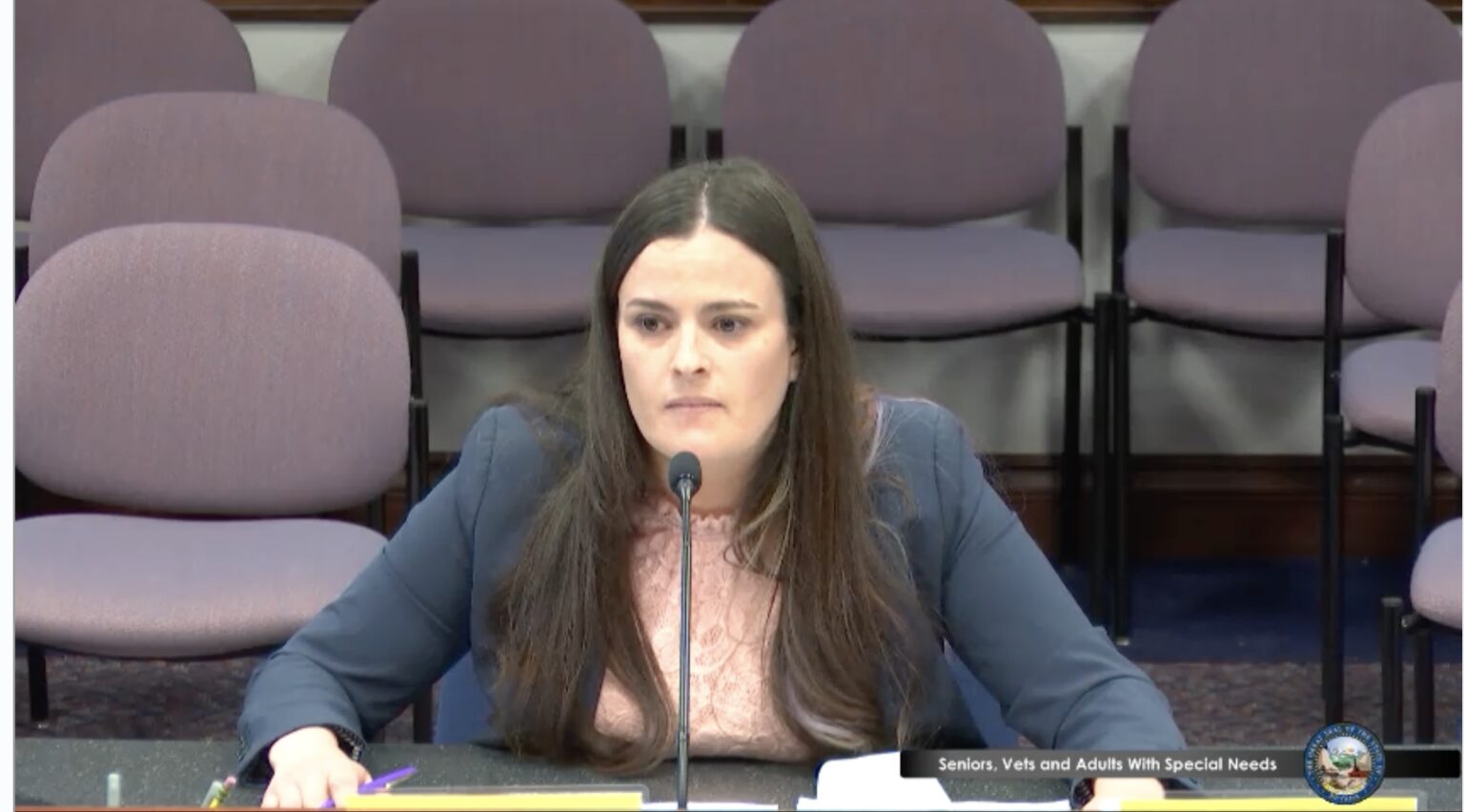5:10
News Story
Presentation on disability council gets legislators riled up against presenter
Advocates are pushing Gov. Joe Lombardo to embrace “Employment First” policies that assist people with disabilities in finding and keeping paying jobs.
Catherine Nielsen, the executive director of the Governor’s Council on Developmental Disabilities and a member of the Nevada Employment First Task Force, told state lawmakers last week that the policy groups are in conversation with the first-term governor’s office to embrace the designation, which could be established via an executive order.
“Gov. (Brian) Sandoval did sign an employment first initiative several years ago,” Nielsen told lawmakers on the interim Legislative Committee on Senior Citizens, Veterans and Adults With Special Needs. “That was not carried through Gov. (Steve) Sisolak’s time in office. We are hopeful Gov. Lombardo — seeing as supportive as he is of employing the state of Nevada — will continue to support that effort.”
The Governor’s Council on Developmental Disabilities is housed within the state’s Department of Health and Human Services but is self-governed and independently authorized by the Federal Developmental Disabilities Assistance and Bill of Rights Act. That federal act covers 75% of the council’s budget, with the remainder coming from state general funds, according to Nielsen.
Nielsen has been with the council since 2016 and executive director since 2021. The council has five employees and one intern; it spent approximately $800,000 on grants, contracts and operations last fiscal year, according to its most recent annual report.
Ongoing areas of concern identified by the council include employment, health, education, transportation and housing. Specific issues identified through surveys and outreach include the state’s long wait lists for services, inadequate transition services for young adults coming out of school-based care, and gaps in support for getting and keeping a paying job.
Employment First policies vary in scope but all center around the shared belief that “employment in the general workforce should be the first and preferred option for individuals with disabilities receiving assistance from publicly funded systems,” according to the Association of People Supporting Employment First (APSE), a national organization pushing the policy.
The Centers for Disease Control and Prevention estimates that 30% of Nevada adults — 742,000 people — have some kind of disability. Those can include physical (14%), cognitive (14%), hearing (7%), and vision (6%) disabilities.
An estimated 8% of Nevada adults — 200,000 people — have an independent living disability.
In addition to its work on employment, the council is also working with the state’s Division of Emergency Management to address disability inclusion within emergency preparedness plans.
“The last time we had a mass shooting at the end of last year there was a student with disabilities who was left in the building unplanned for,” Nielsen said, referring to the on-campus shooting at UNLV on Dec. 6 that killed three faculty members. “We are working with UNLV to make sure that never happens again.”
The council is currently conducting surveys of disabled Nevadans to update its insight, which they will use to recommend policies to the Legislature and governor. The survey will close in January 2025 but reopen in the spring as the council begins drafting its next five-year state plan.
Nielsen said one area of concern emerging from the more than 200 surveys already completed is accessibility of recreational activities.
“Recreational activities aren’t just about going out and having fun,” she continued. “They build a sense of community, networking and skills that cannot be taught in a lot of other settings.”
Icy reception
Nielsen offered some suggestions to the Nevada State Legislature itself, saying there was room for improved accessibility during hearings: “There have been many, many times that we have had people who are deaf and hard of hearing come to the Legislature, request an interpreter … and they remove the interpreter from the screen at various parts of the hearing, especially when it comes to your votes on the floor.”
She continued, “We encourage you, we beg you, to please increase accessibility. Provide interpreters and provide them all the time. … Imagine what it’s like to come to this room and sit in silence and not have any idea what you’re talking about.”
Nielsen’s comments received an icy reception from a pair of Democratic lawmakers who suggested she was offering complaints but no solutions.
“I heard a whole lot of criticisms and not a lot of solutions,” said state Sen. Marilyn Dondero Loop (D-Las Vegas), who suggested “the last 20 minutes” of Nielsen’s hour-long presentation had been critiques.
Dondero Loop pointed out that the Legislature does not have a staff and suggested it should be on the council to reach out and offer interpreters for important upcoming meetings. She also suggested the council consider funding a dedicated school for the deaf that had been requested by earlier presenters during the hearing.
Nielsen responded that her office would be happy to do what they could, but she pushed back on the characterization of her comments as criticism from her or her office directly.
“As much as they may seem like criticisms, it’s not our voices,” she said. “This is the community that has brought these concerns to us. We’re just the people that, unfortunately, have to deliver that bad news, and (we) sometimes have to say this is what your community is saying. … They have concerns.”
She added, “It’s not criticism. It’s passion. It’s their families.”
Nielsen was also rebuked for suggesting the current language of the Nevada State Constitution is “disrespectful and demeaning.”
State Sen. Pat Spearman (D-North Las Vegas), who chairs the interim committee, told Nielsen she should look at the Nevada Equal Rights Amendment, which was proposed by the Legislature in 2017 and passed by voters in 2020, suggesting that it had addressed those issues.
“It is the most expansive Equal Rights Amendment in the country, and that’s not my saying, that’s other people saying,” said Spearman.
But Nielsen was referring to language in the Nevada State Constitution that describes people as “deaf and dumb” and “insane.”
Assembly Joint Resolution 1, which was unanimously passed by the Legislature in 2021 and 2023, proposes removing that language. It will appear before voters as Question 2 on this year’s general election ballot.
If that ballot measure is approved by voters, “insane” would change to “persons with significant mental illness,” “blind” to “persons who are blind or visually impaired,” and “deaf and dumb” to “persons who are deaf or hard of hearing.”
Spearman also took issue with Nielsen suggesting that the lack of interpreters was likely a budget issue for the Legislature, saying that the Legislature’s budget is done in conjunction with the governor’s office.
[Editor’s Note: This story has been updated to correct the spelling of Catherine Nielsen’s name.]
Our stories may be republished online or in print under Creative Commons license CC BY-NC-ND 4.0. We ask that you edit only for style or to shorten, provide proper attribution and link to our website. AP and Getty images may not be republished. Please see our republishing guidelines for use of any other photos and graphics.




